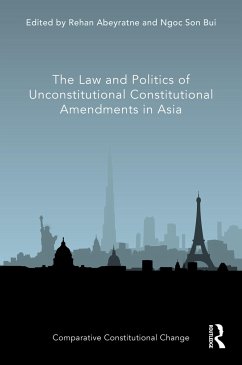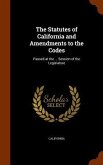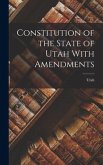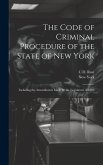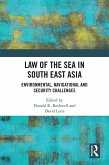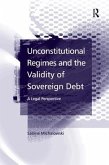The Law and Politics of Unconstitutional Constitutional Amendments in Asia
Herausgeber: Abeyratne, Rehan; Bui, Ngoc Son
The Law and Politics of Unconstitutional Constitutional Amendments in Asia
Herausgeber: Abeyratne, Rehan; Bui, Ngoc Son
- Gebundenes Buch
- Merkliste
- Auf die Merkliste
- Bewerten Bewerten
- Teilen
- Produkt teilen
- Produkterinnerung
- Produkterinnerung
This book explains how the idea and practice of unconstitutional constitutional amendments informs politics through various social and political actors, and in both formal and informal amendment processes. It is the first book-length study of the law and politics of unconstitutional constitutional amendments in Asia.
Andere Kunden interessierten sich auch für
![The Statutes of California and Amendments to the Codes: Passed at the ... Session of the Legislature The Statutes of California and Amendments to the Codes: Passed at the ... Session of the Legislature]() CaliforniaThe Statutes of California and Amendments to the Codes: Passed at the ... Session of the Legislature43,99 €
CaliforniaThe Statutes of California and Amendments to the Codes: Passed at the ... Session of the Legislature43,99 €![Ordinances of the City of Manistee With Amendments to February 20, 1904 Ordinances of the City of Manistee With Amendments to February 20, 1904]() ManisteeOrdinances of the City of Manistee With Amendments to February 20, 190429,99 €
ManisteeOrdinances of the City of Manistee With Amendments to February 20, 190429,99 €![Constitution of the State of Utah With Amendments Constitution of the State of Utah With Amendments]() UtahConstitution of the State of Utah With Amendments28,99 €
UtahConstitution of the State of Utah With Amendments28,99 €![The Code of Criminal Procedure of the State of New York: Including the Amendments Made by the Legislature of 1902 The Code of Criminal Procedure of the State of New York: Including the Amendments Made by the Legislature of 1902]() New YorkThe Code of Criminal Procedure of the State of New York: Including the Amendments Made by the Legislature of 190238,99 €
New YorkThe Code of Criminal Procedure of the State of New York: Including the Amendments Made by the Legislature of 190238,99 €![Constitution of the United States ... With the Amendments Thereto, to Which Are Added Jefferson's Manual of Parliamentary Practice ... the Joint Rules Constitution of the United States ... With the Amendments Thereto, to Which Are Added Jefferson's Manual of Parliamentary Practice ... the Joint Rules]() Constitution of the United States ... With the Amendments Thereto, to Which Are Added Jefferson's Manual of Parliamentary Practice ... the Joint Rules36,99 €
Constitution of the United States ... With the Amendments Thereto, to Which Are Added Jefferson's Manual of Parliamentary Practice ... the Joint Rules36,99 €![Law of the Sea in South East Asia Law of the Sea in South East Asia]() Law of the Sea in South East Asia168,99 €
Law of the Sea in South East Asia168,99 €![Unconstitutional Regimes and the Validity of Sovereign Debt Unconstitutional Regimes and the Validity of Sovereign Debt]() Sabine MichalowskiUnconstitutional Regimes and the Validity of Sovereign Debt177,99 €
Sabine MichalowskiUnconstitutional Regimes and the Validity of Sovereign Debt177,99 €-
-
-
This book explains how the idea and practice of unconstitutional constitutional amendments informs politics through various social and political actors, and in both formal and informal amendment processes. It is the first book-length study of the law and politics of unconstitutional constitutional amendments in Asia.
Produktdetails
- Produktdetails
- Verlag: Routledge
- Seitenzahl: 320
- Erscheinungstermin: 30. November 2021
- Englisch
- Abmessung: 240mm x 161mm x 22mm
- Gewicht: 646g
- ISBN-13: 9780367562595
- ISBN-10: 0367562596
- Artikelnr.: 62799579
- Herstellerkennzeichnung
- Libri GmbH
- Europaallee 1
- 36244 Bad Hersfeld
- gpsr@libri.de
- Verlag: Routledge
- Seitenzahl: 320
- Erscheinungstermin: 30. November 2021
- Englisch
- Abmessung: 240mm x 161mm x 22mm
- Gewicht: 646g
- ISBN-13: 9780367562595
- ISBN-10: 0367562596
- Artikelnr.: 62799579
- Herstellerkennzeichnung
- Libri GmbH
- Europaallee 1
- 36244 Bad Hersfeld
- gpsr@libri.de
Rehan Abeyratne is Associate Professor of Law and Executive Director of the Centre for Comparative and Transnational Law at the Chinese University of Hong Kong. He is a co-editor of Towering Judges: A Comparative Study of Constitutional Judges (2021) as well as the forthcoming Routledge Handbook of Asian Parliaments. Ngoc Son Bui is Associate Professor of Asian Laws at the University of Oxford Faculty of Law. He is the author of Constitutional Change in the Contemporary Socialist World (2020) and Confucian Constitutionalism in East Asia (Routledge, 2016).
Introduction
1. Unconstitutional Constitutional Amendments as Constitutional Politics
Part I: Discursive Model
2. The Politics Of Unconstitutional Constitutional Amendment in
Japan:The Case of The Pacifist Article 9
3. 'State Form' in the Theory and Practice of Constitutional Change in
Modern China
4. Unconstitutional Constitution in Vietnamese Discourse
Part II: Denotive Model
5. The Law and Politics of Unconstitutional Constitutional Amendments in
Malaysia
6. Amending Constitutional Standards of Parliamentary Piety in Pakistan?
Political and Judicial Debates
7. Limiting Constituent Power? Unconstitutional Constitutional
Amendments and Time-Bound Constitution Making in Nepal
Part III: Decisive Model
8. Beyond Unconstitutionality: The Public Oversights of Constitutional
Revision in Taiwan
9. Thailand's Unamendability: Politics of Two Democracies
10. Constitutional Politics Over (Un)Constitutional Amendments: The
Indian Experience
11. The Politics of Unconstitutional Amendment in Bangladesh
Part IV. Commentaries
12. The Power of Judicial Nullification in Asia and the World
13. Is the 'Basic Structure Doctrine' a Basic Structure Doctrine?
14. Eternity Clauses as Tools for Exclusionary Constitutional Projects
15. Why There? Explanatory Theories and Institutional Features Behind
Unconstitutional Constitutional Amendments in Asia
1. Unconstitutional Constitutional Amendments as Constitutional Politics
Part I: Discursive Model
2. The Politics Of Unconstitutional Constitutional Amendment in
Japan:The Case of The Pacifist Article 9
3. 'State Form' in the Theory and Practice of Constitutional Change in
Modern China
4. Unconstitutional Constitution in Vietnamese Discourse
Part II: Denotive Model
5. The Law and Politics of Unconstitutional Constitutional Amendments in
Malaysia
6. Amending Constitutional Standards of Parliamentary Piety in Pakistan?
Political and Judicial Debates
7. Limiting Constituent Power? Unconstitutional Constitutional
Amendments and Time-Bound Constitution Making in Nepal
Part III: Decisive Model
8. Beyond Unconstitutionality: The Public Oversights of Constitutional
Revision in Taiwan
9. Thailand's Unamendability: Politics of Two Democracies
10. Constitutional Politics Over (Un)Constitutional Amendments: The
Indian Experience
11. The Politics of Unconstitutional Amendment in Bangladesh
Part IV. Commentaries
12. The Power of Judicial Nullification in Asia and the World
13. Is the 'Basic Structure Doctrine' a Basic Structure Doctrine?
14. Eternity Clauses as Tools for Exclusionary Constitutional Projects
15. Why There? Explanatory Theories and Institutional Features Behind
Unconstitutional Constitutional Amendments in Asia
Introduction
1. Unconstitutional Constitutional Amendments as Constitutional Politics
Part I: Discursive Model
2. The Politics Of Unconstitutional Constitutional Amendment in
Japan:The Case of The Pacifist Article 9
3. 'State Form' in the Theory and Practice of Constitutional Change in
Modern China
4. Unconstitutional Constitution in Vietnamese Discourse
Part II: Denotive Model
5. The Law and Politics of Unconstitutional Constitutional Amendments in
Malaysia
6. Amending Constitutional Standards of Parliamentary Piety in Pakistan?
Political and Judicial Debates
7. Limiting Constituent Power? Unconstitutional Constitutional
Amendments and Time-Bound Constitution Making in Nepal
Part III: Decisive Model
8. Beyond Unconstitutionality: The Public Oversights of Constitutional
Revision in Taiwan
9. Thailand's Unamendability: Politics of Two Democracies
10. Constitutional Politics Over (Un)Constitutional Amendments: The
Indian Experience
11. The Politics of Unconstitutional Amendment in Bangladesh
Part IV. Commentaries
12. The Power of Judicial Nullification in Asia and the World
13. Is the 'Basic Structure Doctrine' a Basic Structure Doctrine?
14. Eternity Clauses as Tools for Exclusionary Constitutional Projects
15. Why There? Explanatory Theories and Institutional Features Behind
Unconstitutional Constitutional Amendments in Asia
1. Unconstitutional Constitutional Amendments as Constitutional Politics
Part I: Discursive Model
2. The Politics Of Unconstitutional Constitutional Amendment in
Japan:The Case of The Pacifist Article 9
3. 'State Form' in the Theory and Practice of Constitutional Change in
Modern China
4. Unconstitutional Constitution in Vietnamese Discourse
Part II: Denotive Model
5. The Law and Politics of Unconstitutional Constitutional Amendments in
Malaysia
6. Amending Constitutional Standards of Parliamentary Piety in Pakistan?
Political and Judicial Debates
7. Limiting Constituent Power? Unconstitutional Constitutional
Amendments and Time-Bound Constitution Making in Nepal
Part III: Decisive Model
8. Beyond Unconstitutionality: The Public Oversights of Constitutional
Revision in Taiwan
9. Thailand's Unamendability: Politics of Two Democracies
10. Constitutional Politics Over (Un)Constitutional Amendments: The
Indian Experience
11. The Politics of Unconstitutional Amendment in Bangladesh
Part IV. Commentaries
12. The Power of Judicial Nullification in Asia and the World
13. Is the 'Basic Structure Doctrine' a Basic Structure Doctrine?
14. Eternity Clauses as Tools for Exclusionary Constitutional Projects
15. Why There? Explanatory Theories and Institutional Features Behind
Unconstitutional Constitutional Amendments in Asia

